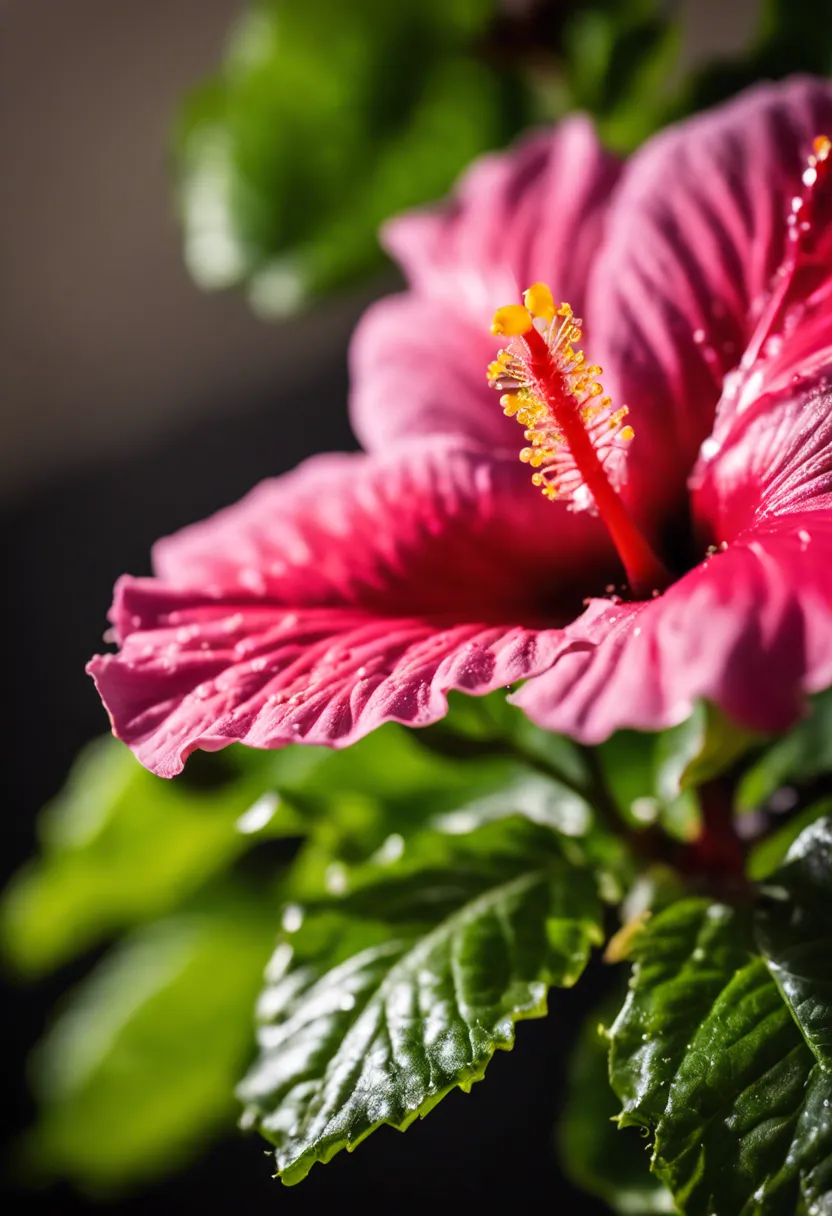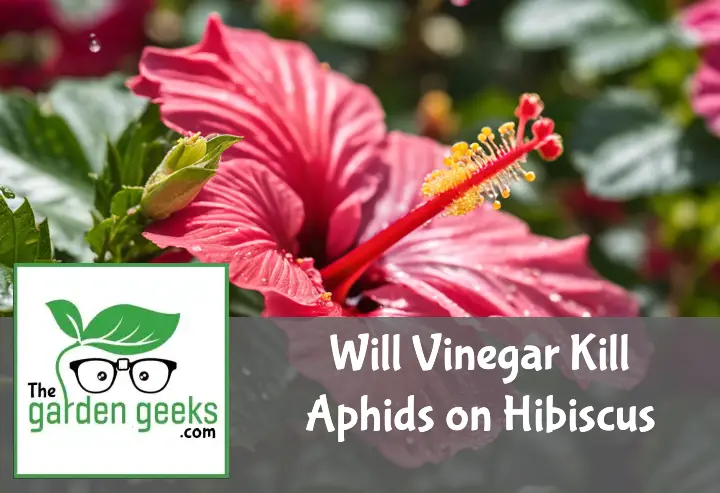Did you know that the aphid, a tiny insect not bigger than an apple seed, is one of the most destructive pests for hibiscus plants? These little creatures can wreak havoc on your beautiful blooms in no time.
But here’s the good news – there might be a simple solution lurking in your kitchen! Yes, we’re talking about vinegar. The question we are exploring today is – will “Vinegar Kill Aphids on Hibiscus”?
Keep reading as we delve into this topic, providing you with valuable insights and practical advice to help protect your hibiscus from these pesky invaders.
Quick Answer
- Yes, vinegar can kill aphids on hibiscus. However, it’s not the most gentle method and could harm your plant if used incorrectly.
- Vinegar works by dehydrating the aphids, but it can also damage the hibiscus leaves if applied in high concentrations or under direct sunlight.
- There are alternative methods to control aphids, such as chemical pesticides, other natural remedies, and cultural practices.
- Always remember to apply vinegar safely to avoid damaging your hibiscus plants.

Understanding Aphids and Their Impact on Hibiscus
Aphids are tiny bugs that can cause big problems for your hibiscus plants. They suck the sap out of the leaves and stems, making the plant weak and unhappy.
Identifying Aphids on Your Hibiscus
Spotting aphid infestations on hibiscus isn’t too hard once you know what to look for. These little pests are usually green or black and hang out on the undersides of leaves or stems. If you see a bunch of them together, it’s like they’re having a party at your plant’s expense.
Another sign of aphids is sticky goo on the leaves. This is called honeydew (but it’s not as sweet as it sounds). It can attract other unwanted guests like ants or sooty mold. Yuck!
There are different types of aphids, but they all do pretty much the same damage. Some might prefer one part of your plant over another, but they all love to feast on hibiscus.
The Damage Caused by Aphids to Hibiscus Plants
When aphids attack, they leave behind more than just sticky leaves. The first thing you’ll probably notice is that your hibiscus looks sad. Its leaves might turn yellow, curl up, or even fall off.
But wait, there’s more! Over time, an aphid infestation can really weaken your plant. It won’t grow as well and might not bloom as much. In severe cases, it could even die if we don’t fight back.
To protect our beloved hibiscuses from these pesky pests, we need to be vigilant. Keep an eye out for signs of trouble and act fast to keep aphids away from your garden party.
Will Vinegar Kill Aphids on Hibiscus?
How Vinegar Affects Aphids
Vinegar, that common kitchen staple, might just be your next aphid control superhero. When aphids invade your hibiscus, they suck the life out of it. Literally. They’re like tiny vampires for plants. Now, imagine spraying a little vinegar on them. It’s not exactly their kryptonite, but it’s close.
The thing is, vinegar is acidic. When you mix it with water and spray it on aphids, they don’t like it one bit. This mixture can kill some aphids on contact or make them think twice about sticking around. However, don’t expect a Hollywood-style explosion where all your aphid problems vanish with a single spray.
Some folks swear by this method; others find it’s more of a deterrent than an aphid apocalypse. The truth? It depends on how determined those little bugs are and how often you’re willing to play the role of plant protector with your vinegar spray bottle in hand.
Remember though, while vinegar might seem like a magic potion against aphids, it’s not without its flaws. Which brings us to our next point…
Potential Risks of Using Vinegar on Hibiscus Plants
So here’s the kicker – while vinegar can send aphids packing, it’s not exactly a spa treatment for your hibiscus plants. Think of it this way: if your skin doesn’t like something harsh, chances are your plant feels the same.
Vinegar is acidic and can harm the delicate leaves of your hibiscus if used too liberally or too often. You might see brown spots or wilted leaves as signs that your plant is shouting “I’m not loving this!”
And let’s not forget about the soil. Too much vinegar can mess with the pH level of the soil, making life tough for your hibiscus in the long run. Healthy soil equals happy plants equals no room for uninvited guests like aphids.
In short, using vinegar as an insecticide should be more like a pinch of salt rather than pouring the whole shaker. Always test a small area first and wait to see how your plant reacts before going all in.



Alternative Methods to Control Aphids on Hibiscus


Exploring different ways to keep those pesky aphids away from your hibiscus can be a game-changer. Let’s dive into some effective strategies.
Chemical Pesticides: Types and Application
When it comes to aphid-specific chemical pesticides, there’s a variety to choose from. Some are like a one-shot deal for aphids, knocking them out quickly. But remember, it’s all about how you use them. Applying these potions to your hibiscus needs care. You don’t want to go overboard and harm the plant or yourself. So, wearing gloves and following the instructions is key.
Safety first, right? When using effective chemical treatments for aphids, always check the label for safety measures in pesticide application. There are different types of aphid pesticides available, but not all are friendly to every plant or pet you might have around.
Natural Remedies Beyond Vinegar
Now, if chemicals aren’t your thing, there are plenty of natural alternatives to vinegar for aphids that won’t hurt your hibiscus or the planet. One popular choice is soapy water – just a bit of dish soap mixed with water can do wonders. It’s like giving your plants a bath that sends aphids packing.
Another cool trick is using neem oil. This stuff is gold when it comes to organic solutions for aphid control. It’s like putting up an invisible shield around your hibiscus that keeps bugs at bay without harming bees or butterflies.
And let’s not forget about ladybugs! These little guys are non-toxic remedies for hibiscus pests and love munching on aphids. It’s like inviting nature’s pest control over for dinner.
Cultural Practices to Prevent Aphid Infestations
Believe it or not, how you take care of your garden can make a big difference in keeping those tiny invaders away from your hibiscus. For starters, making sure your plants aren’t too cozy together helps prevent aphid infestations with cultural practices by improving air flow and reducing hiding spots for pests.
Another smart move is regularly checking your plants for early signs of trouble. Catching those critters early means you can stop an invasion before it starts with gardening techniques against pests.
Lastly, choosing the right companions for your hibiscus can also serve as sustainable pest management strategies. Some plants naturally repel pests or attract beneficial insects that will help keep your garden healthy and happy without resorting to harsh chemicals.
Comparing Efficacy: Vinegar vs. Other Aphid Treatments
When it comes to battling aphids on your beloved hibiscus, you might wonder if vinegar is the superhero you need or if there are other champions in the pest control arena. Let’s pit vinegar against other popular aphid treatments to see how they stack up. Spoiler alert: It’s like comparing apples and oranges, but each has its unique strengths.
-
Vinegar solution: This home remedy is a hit for many because it’s cheap, easy to make, and you probably already have it in your kitchen. Mix water with a bit of vinegar, spray it on the aphids, and boom—they’re not happy campers. But be careful; too much vinegar can harm your plant more than help.
-
Insecticidal soap: This is the gentle giant of aphid warfare. It’s safe for your plants, pets, and kids but tough on those pesky bugs. You can find it at most garden stores or make your own with some simple ingredients from home. It works by breaking down the aphid’s outer layer, causing them to dehydrate and meet their maker.
-
Neem oil: Think of this as the ninja of the group—silent but deadly (to aphids, that is). Neem oil is a natural pesticide that doesn’t just kill aphids; it also messes with their ability to grow and lay eggs. Plus, it’s safe for beneficial insects like bees and ladybugs who help keep your garden healthy.
-
Chemical pesticides: These are the big guns. They’re super effective at killing aphids fast but come with a downside. They can also harm beneficial insects and might not be the best choice if you’re trying to keep your garden as natural as possible. Always read the label carefully and use them as a last resort.
Each method has its place in an integrated pest management strategy depending on your situation, preferences, and goals for your garden.
Overview of Aphid Control Methods for Hibiscus
| Method | Description | Effectiveness | Pros | Cons |
|---|---|---|---|---|
| Vinegar Spray | A solution of vinegar and water sprayed directly on the aphids. | Moderate to High | Non-toxic, inexpensive, easy to make at home. | Can potentially harm the plant if not diluted properly. |
| Insecticidal Soap | Commercially available soap designed to kill insects without harming plants. | High | Specifically designed for pest control, safe for most plants. | More expensive than homemade solutions, may require multiple applications. |
| Neem Oil Spray | A natural pesticide derived from the neem tree. | High | Organic, non-toxic to pets and humans, also controls other pests. | Can be harmful to beneficial insects like bees and butterflies if not used carefully. |
| Ladybugs | Natural predators of aphids that can be introduced into the garden. | Variable | Completely natural method, also helps with other pests. | Requires a suitable habitat to keep ladybugs in the area, effectiveness depends on ladybug population size. |
| Chemical Pesticides | Commercially available pesticides specifically designed to kill aphids. | Very High | Fast acting and highly effective. | Toxic to other animals and insects, potential environmental impact. |
How to Apply Vinegar Safely on Hibiscus Plants
Applying vinegar to your hibiscus plants can be a game-changer in battling those pesky aphids, but it’s like walking a tightrope. Too much or too strong, and you might harm the plant you’re trying to protect. Here’s how to do it safely, ensuring that your hibiscus stays healthy and aphid-free.
-
Dilute the vinegar properly before anything else. Mix 1 part white vinegar with 3 parts water. This ratio is strong enough to bother the aphids but gentle enough not to harm your hibiscus plants.
-
Test the solution on a small part of the plant first. Choose a leaf at the bottom that won’t be too noticeable. Apply a little of your vinegar solution and wait 24 hours. If the leaf shows no signs of damage, like wilting or discoloration, you’re good to go.
-
Spray in the morning or late evening when the sun isn’t too harsh. Direct sunlight can interact with the vinegar and cause burning on the leaves, so picking the right time is crucial.
-
Cover all areas where aphids are seen or suspected with your spray bottle, focusing on the undersides of leaves where these bugs love to hide and feast.
-
Repeat if necessary, but allow at least a few days between applications to monitor how your plant responds. Overdoing it could stress or harm your hibiscus.
-
Rinse your plant after 24 hours with clean water from a hose or watering can. This helps remove any residual vinegar which could potentially damage the plant if left for too long.
-
Finally, always monitor your plant’s reaction over time after applying vinegar treatments. Look out for any signs of distress in your hibiscus such as leaf drop, browning edges, or overall wilting and adjust your approach accordingly.
Wrapping It Up
So, does vinegar kill aphids on hibiscus? You bet it does! But remember, it’s not a magic potion. Vinegar is just one tool in your aphid-busting toolkit.
Don’t forget about other methods too. Encouraging beneficial insects and using soaps or oils can also help keep those pesky aphids at bay.
Now that you’re armed with this knowledge, go forth and protect your hibiscus! For more details, check out our full article on Vinegar Kill Aphids on Hibiscus.


FAQs about ‘Will Vinegar Kill Aphids on Hibiscus?’.
What are the signs of aphid infestation on hibiscus plants?
Aphids are tiny insects that can cause damage to your hibiscus plants. Signs of an infestation include yellowing leaves, stunted growth, and a sticky substance on the plant or nearby surfaces.
Can I use any type of vinegar to kill aphids?
While any type of vinegar may have some effect on aphids, white distilled vinegar is often recommended as it is not harmful to most plants when used in moderation.
How often should I apply vinegar to my hibiscus plant if it’s infested with aphids?
If you’re using vinegar as an aphid treatment, it’s best to apply it every few days until you no longer see signs of the pests. However, be careful not to overdo it as too much vinegar can harm your plant.
Are there other household items that can be used to treat aphid infestations?
Yes, besides vinegar, other household items like dish soap mixed with water or garlic and onion spray can also be effective against aphids. Always test a small area first to ensure it won’t harm your plant.
Will the vinegar treatment work for other types of pests or just aphids?
Vinegar is known for its insecticidal properties and can work against various types of pests including mites and whiteflies. However, its effectiveness might vary depending on the pest type.
Can using vinegar prevent future aphid infestations?
While vinegar can help control an existing aphid population, it doesn’t necessarily prevent future infestations. Regular monitoring and cultural practices like proper watering and pruning are essential for prevention.


